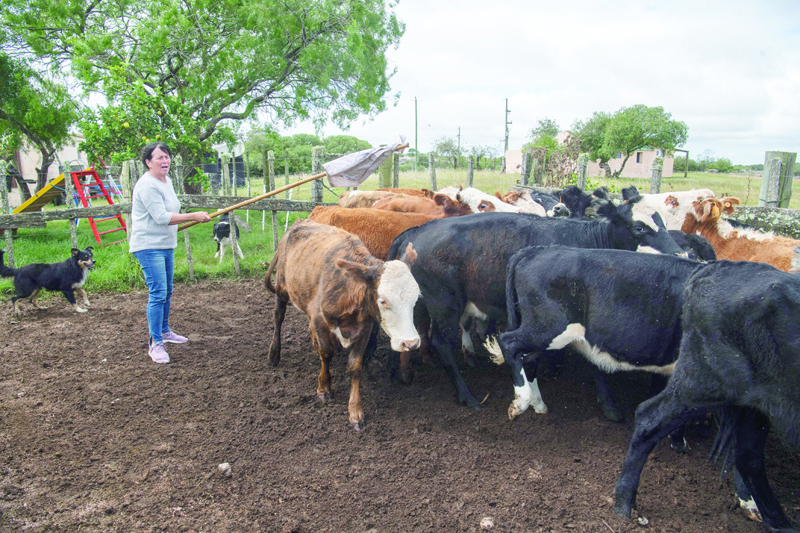 Rosa Correa herds cows to be vaccinated against foot-and-mouth disease in a field in Cerro Pelado, Lavalleja Department, 160 km northeast of Montevideo, Uruguay.-AFP
Rosa Correa herds cows to be vaccinated against foot-and-mouth disease in a field in Cerro Pelado, Lavalleja Department, 160 km northeast of Montevideo, Uruguay.-AFPCERRO PELADO, Uruguay: Rotating cattle to keep the grass long, synching cows' pregnancies and improving bovine diet are just some of the tactics Uruguayan farmers are using to mitigate the impact of cattle on climate change. There are four cows for each person in Uruguay, the South American country of 3.4 million people where agriculture accounts for 75 percent of greenhouse gas emissions. A large part of that comes from the methane emitted by cattle, meaning Uruguay has no choice but to focus on livestock if it wants to combat global warming. Cattle methane, which accounts for 62 percent of emissions, "weighs heavily on climate change," said Cecilia Jones, the livestock ministry's coordinator on the issue.
Looking out across a group of 20 cows at a farm in the southeastern Lavalleja department, Rosa Correa remarked that "all these need to get pregnant." Her farm is one of 62 taking part in a livestock and climate initiative launched by Uruguay in 2020 to help reduce direct and indirect emissions, sequester carbon in the soil and reverse land deterioration. The program, made possible with help from the UN's Food and Agriculture Organization (FAO) and funding from the Global Environment Facility, is meant to increase productivity "through smart climate practices," Soldeda Bergos, the initiative's coordinator, said.
Sustainable productivity
Synchronizing mating and pregnancies as well as the weaning of calves are some of the practices that Correa, 56, and her husband Alejandro Rodriguez, 55, began implementing based on advice from the FAO. It's "one of the ways to increase productivity in a sustainable way," said Correa, since more kilograms (pounds) of meat are produced when more calves can be birthed from the same herd. The couple and their two daughters manage an 800-hectare (1,975-acre) farm that has been in the family for 35 years. "In Uruguay livestock has been the mainstay of agriculture for 400 years, and it's mainly produced on natural fields," said Bergos.
Although only eight percent of the globe is covered by productive temperate grasslands, that figure is 50 percent in Uruguay, which Bergos described as a paradise for livestock farming and a "valuable resource." Uruguay has little industry and so relies heavily on its meat exports, particularly beef, with more than 2.2 million cattle slaughtered in 2019, according to the national meat institute.
The country exported more than 330,000 tons of beef that year, worth more than $1.8 billion and representing 83.4 percent of the country's meat exports. Much of that meat is exported to China, the United States and Brazil. Uruguayans also consume more beef per person per year than anywhere else in the world at almost 48 kilograms (105 pounds). Many were angered several weeks ago when Us billionaire philanthropist Bill Gates said that rich countries should eat synthetic meat to combat climate change. "There are people who say 'cattle don't pollute, other things pollute much more.' That's true, but we have to try not to contaminate anything," said Correa.
'Learning to look down'
Managing fields is vital to the project since well-maintained pastureland can hold more carbon and thus compensate for the emissions livestock produce. Correa said that being involved in the project has meant "learning to look down" at the grass. "We were guided a lot by the condition of the cattle and didn't look at the seasonality of the pasture, the growth," she said. "The more leafy and longer the grass, the better its quality. We learned to regulate the pastureland," in terms of the capacity of a field depending on the season.
Since farmers live where they work they're conscious about environmental impacts such as droughts and floods, said Bergos, with the project demonstrating their will to help on such issues. "Before we were interested" in climate change "but we didn't know how to help," Correa said. "It's important that we can all get involved in this." - AFP










